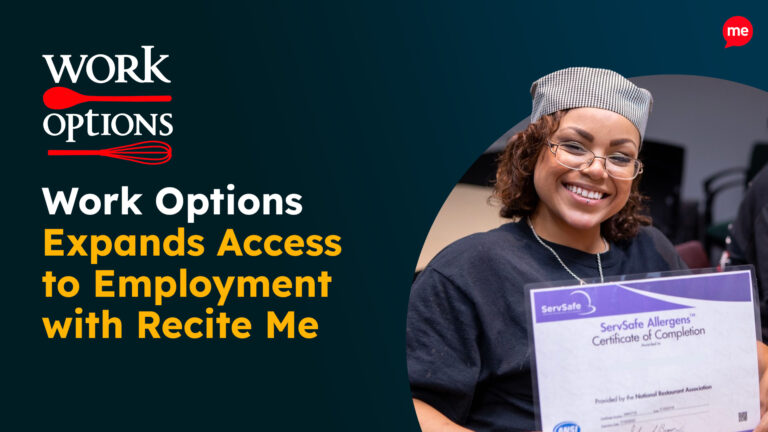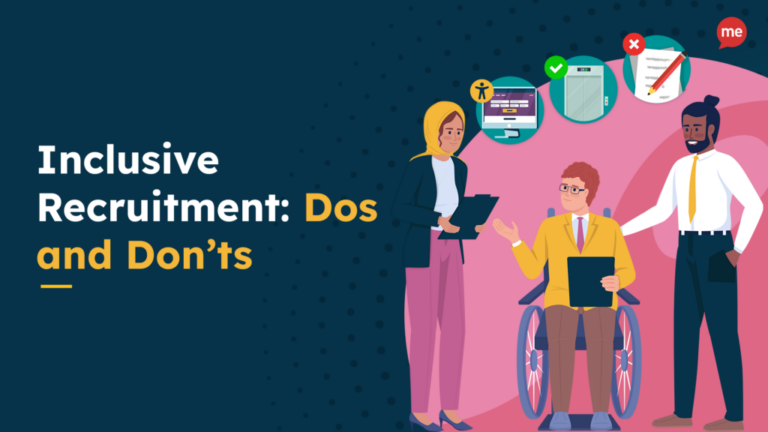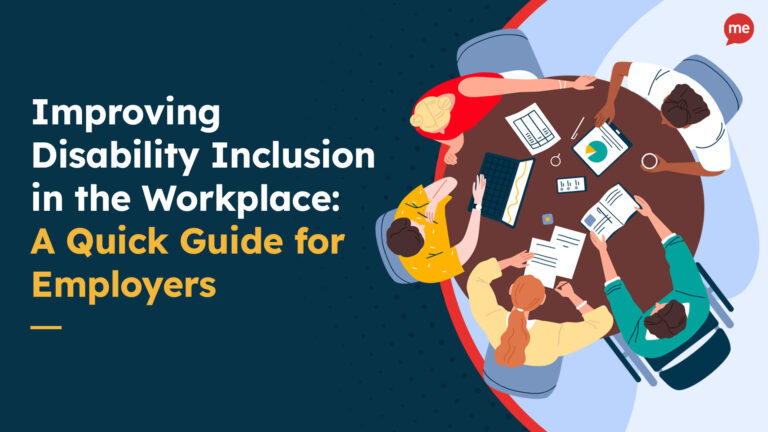Researching a new career or applying for a job online may not be an easy task for everyone, as modern recruitment processes rely so heavily on digital technology. Many of the 6.2 million people in Canada who have a disability often encounter obstacles online when applying for jobs.
Website accessibility and inclusion factors have never been more important in the careers and employment sector, as job searches and recruitment drives are increasingly taking place online.
“Accessibility is often forgotten about when speaking about diversity and inclusion, but it is the missing link. You can have the most diverse workforce…but if anyone experiences barriers to access then you haven’t ensured inclusion for all.”
Michael Bach, in his book, Birds of All Feathers: Doing Diversity and Inclusion Right
What is Inclusive Recruitment?
Inclusive recruitment covers the entire candidate experience from discovery and attraction right through to application, onboarding and beyond. It is the process of being able to offer a barrier-free experience where everyone is able to embrace and fulfill the full recruitment journey on a level playing field.
It is worth noting that diversity and inclusion are not the same thing and improving one will not automatically solve problems with the other.
What Sort of Barriers do Applicants Face Online?
Typically, when recruiters and employers think of accessibility, they consider only the physical access needs of disabled candidates and employees. This is a short-sighted view, as in addition to physical access barriers, there is also a multitude of other disabilities and conditions that need to be accommodated in the nonphysical world. Examples include:
Visual impairments
Deafblindness
Colour blindness
Dyslexia
Hyperlexia
Dyspraxia
ADHD
Epilepsy
Another barrier for people viewing content online can be language, specifically if they speak English as a second language, or not at all.
Candidates and employees who struggle with any of the above have a much harder time finding and staying in employment, as the information on websites is not as easy for them to access, read, understand, or act upon.

Did you know…?
Only 51% of applications from disabled people result in an interview, compared to 69% of non-disabled applicants.
Nearly 40% of disabled applicants feel insecure about getting hired as they believe employers will disregard their application based on their impairment or condition.
On average, disabled people apply for 60% more jobs before finding one.
Only one in three job seekers think employers and recruiters make online job applications suitably accessible for disabled people.
Only 26% of jobseekers think employers and recruiters make online job applications suitably accessible for people who speak English as a second language.
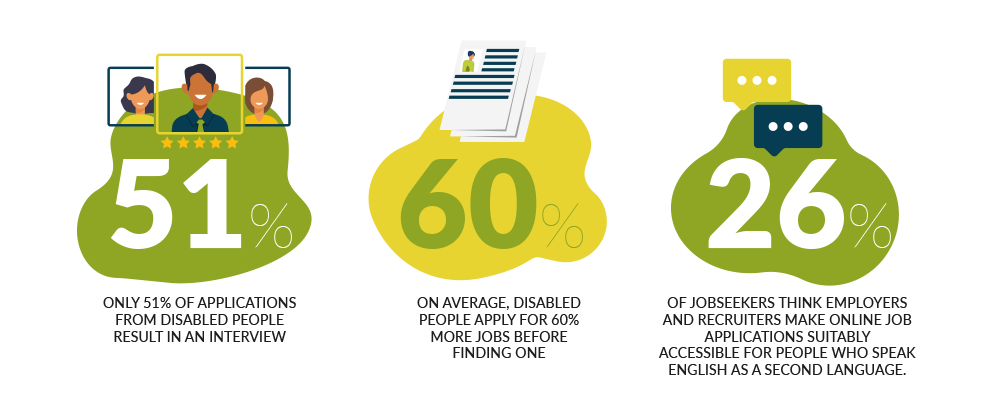
Why Should Employers Provide an Inclusive Candidate Journey?
The key for employers is to alter their perceptions and the way they think about disability, and make positive changes to the way they attract, recruit, develop, and retain disabled employees.
Many companies shy away from web accessibility and inclusion factors as they perceive them as being complex, expensive, or simply too difficult to workaround. However, this is a misconception, as the average cost of making an accommodation for a disabled employee is relatively low, and data shows that employees with disabilities take less time off and tend to stay with companies longer. Other key advantages include:
Drawing from the widest pool of talent available.
Discovering new skill sets – neurodiverse employees are often creative thinkers and strategic problem solvers.
Acquiring high-quality staff who are skilled, hardworking, loyal, and highly motivated.
Improving innovation thanks to the wider perspective gained by having a more diverse team.
Creating equal opportunities that make everyone feel included.
Demonstrating fairness in the workplace.
Improving staff morale.
Showing customers and other businesses that you are committed to equality in the workplace.
Increasing revenue and profits – there is growing evidence of links between improved inclusion and financial success.
Did you know…
Throughout 2021, Recite Me witnessed a surge in recruitment companies and in-house talent teams using our assistive technology to create inclusive candidate journeys. Across our career and recruitment clients specifically, our data shows:
A 150% increase in the use of our accessibility technology to customize application experiences in 2021.
More than 488,942 web pages were viewed with Recite Me technology by people searching for their next careers in 2021.
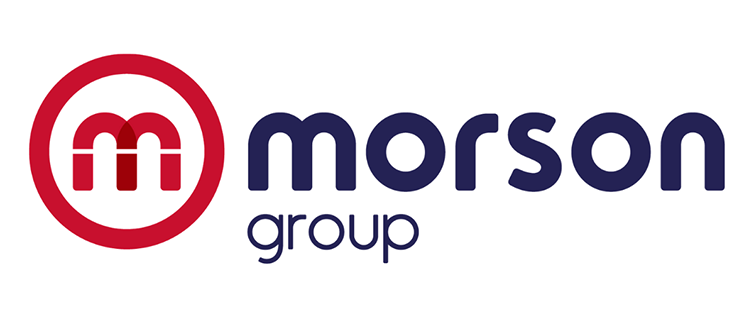 A Case Study: Morson Group
A Case Study: Morson Group
Morson Group is a global technical recruiter that adopted Recite Me accessibility technology in 2019. The Morson team is confident that by educating their clients about accessibility and providing an inclusive candidate journey they can improve the lives of their contractor base and their own employees.
Everyone should have the opportunity to find their dream job. With our assistive toolbar installed on their site, Morson Group has dramatically increased their reach. In January 2021 almost 4,000 people utilized Recite Me web accessibility tools on the Morson Group website to help them with their job search.
“Recite Me technology ensures every part of our recruitment process is accessible to everyone, from browsing to making an application. By employing Recite Me, we can ensure that every candidate gets an equal chance at developing their career by being able to access the same opportunities to gain and maintain employment.”
Rebekah Lee, Head of Marketing

A Case Study: SNC Lavalin
With over 50,000 employees spread across operations and offices around the globe, SNC Lavalin is a world leader in consultancy and project management in a range of industries. The brand is well known for its diversity policies and active approach to thinking and working differently. So their recruitment team is always looking for people who experience the world in different ways.
“Recite Me goes to the very heart of our values. It’s helping us build a diverse, inclusive environment where we respect, understand and value different people – starting with how we recruit them.”
Victoria Jones, Head of Recruitment
Accessibility Versus Inclusion
Or to put it another way, equality versus equity. Forbes Magazine highlighted a good example of this in their article about equity and accessibility in the workplace, where it was explained that equality would be giving everyone a house to live in, whereas equity would be giving people in tropical climates extra cooling systems and mosquito screens, and those in colder climates better insulation and heating.
The same principle applies to web accessibility. Complying with accessibility guidelines and adopting an accessible website build are great steps forward. But compliance alone does not enable users to create a fully customizable experience that works for every individual.
“What makes a website truly inclusive is giving people as many choices as possible so they can modify their own view and consume the information in a way that is personalized and tailored to their individual needs. It is in this area of advocating web accessibility, but also promoting digital inclusion at a much higher level, in which Recite Me sits. to put it simply, accessibility + usability = inclusion”
Ross Linnett, Recite Me Founder & CEO

How does Web Accessibility Technology Work?
Recite Me’s assistive toolbar supports a diverse range of applicants, recruiters, and staff in the workplace by providing a variety of tools that allow users to create a fully customizable experience. Our accessibility features can either be used individually or combined to make multiple adjustments for ultimate ease of use. Users can:
Personalize font size, type, and colour options to make each web page easier to read.
Utilize the mask screen tool, which isolates parts of the page to help with focus.
Use the ruler tool to make reading easier.
Download content as an audio file as an alternative to reading.
Convert page content into over 100 different on-screen languages.
Have the page read aloud in a choice of 65 different languages.
Customize PDF documents and have them read aloud or translated.
Over 3,900 organizations already use Recite Me to make their websites more accessible for people with disabilities. To find out more or to book a demo please contact the team today.
